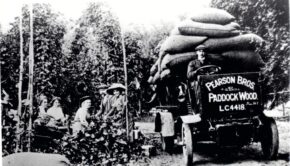Never mind the Sweeney, here’s The Knock
I read recently that HMRC (that’s the taxmen if you didn’t know) are trying to get authorisation to break the speed limit while going about their day to day business. Some of you may find this a little bizarre; do they need to break the speed limit so they can rush into work and get stuck in to the mound of tax returns waiting in their in-tray? Actually, they claim it’s for when they’re conducting surveillance operations against drug traffickers, money launderers and other assorted wrong ‘uns.
Now, I have a theory about this, entirely based on guesswork you understand, but I’ll run it by you anyway. Let us start with the VAT man. You may be surprised to learn that VAT has only been with us since 1973 but, since its inception, those who work for the VAT have considered themselves the roughest toughest dudes in the world of tax collection. In fact, VAT is actually collected for the treasury by Britain’s army of businesses of all shapes and sizes; the VAT man is simply there to make sure they do a proper job of it. If a business is a little tardy in handing over its corporation tax or PAYE, HMRC will charge it interest at about 8%. If a business is one day late paying its VAT bill, HMRC can fine it 15% of the outstanding amount; if my maths is correct that’s a representative APR of around 5,475% – wonga.com eat your heart out! If a business gets seriously behind on its PAYE, HMRC may take it to court. If it gets seriously behind with its VAT, the VAT man may put it into liquidation. That’s like a loan shark shooting a customer because he didn’t make a weekly repayment; the loan shark doesn’t get his money back but he certainly sends out a strong message.
For reasons lost in the mists of time, VAT originally was part of HM Customs and Excise. As well as collecting VAT, fuel duty and so forth, HMCE also protected the nation’s borders against smugglers. To help them do this, they had their own police force, nicknamed The Knock, and they enjoyed powers that even The Sweeney could only dream of. ITV even made a TV series about The Knock which they broadcast for six years during the 90s; I’d imagine that most VAT Officers have every single episode on DVD. In 2005 HMCE joined forces with what had previously been the Inland Revenue to form a new “super” tax department, HM Revenue and Customs. The Knock also became part of HMRC and the VAT men continued to behave as they always had done.
In 2008 disaster struck; The Knock was transferred to the UK Borders Agency but the VAT men were left behind at HMRC. There were no more surveillance operations, no more raids and no more searches without the need for a warrant; that was all handled by the Borders Agency with a little help from their friends at SOCA, the Serious and Organised Crime Agency. All of this begs the question, why would anyone at HMRC need authorisation to break the speed limit?
I really hope that HMRC don’t get their wish; I think it would just be the thin end of the wedge. The next thing would be that they’d want guns and then, when the VAT men arrive to chisel some money out of a struggling businessman, they’d turn up wearing flak jackets and Kevlar vests with Heckler and Koch machine pistols. It’s understandable really, all those small businessmen crouching behind their desks screaming, “You’ll never take me alive.”
Well, I’m a small businessman and I’m well accustomed to juggling Cashflow and worrying about which Peter I will have to rob to pay Paul the VAT man. I can only say that perhaps they’d be better off sending their officers on a customer services training course than a high speed driving course.






Comments